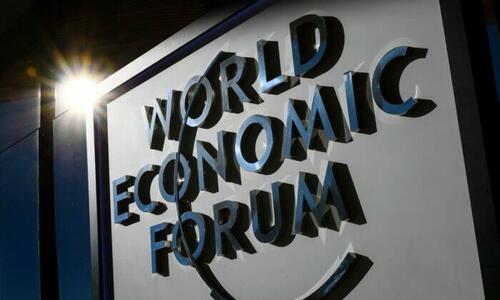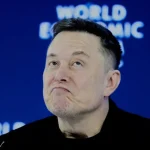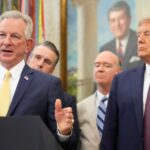
Commentary by Jack McPherrin via The Epoch Times,
Day two of the World Economic Forum’s (WEF) Annual Meeting in Davos, Switzerland, started off on a concerning note.

Some of the chief architects of environmental, social, and governance (ESG) scores met during a session called “Global ESG for Global Resilience,” and have clearly decided to double down on their objective for a new global economic order that transcends national borders and replaces free-market capitalism.
Destroying free-market capitalism in favor of a new “stakeholder” model, in which global elites hold all the power, has been their objective for years. A single ESG system gets them much closer to this goal, and will be significantly more effective at eroding national sovereignty, circumventing democratic processes, coercing companies into compliance, and ultimately restricting individual choice.
Early in the session, Hong Kong Stock Exchange Chairman Laura Cha got right to the point. She revealed, “In order for the [ESG] disclosures to be meaningful, we need to have a harmonized standard. … It would be very good in terms of the work that the ISSB [International Sustainability Standards Board] is doing to bring about some standardized global measures.”
The ISSB is a new standard-setting board developed for the sole purpose of institutionalizing this global framework.
ISSB Chairman Emmanuel Faber confirmed that these efforts have begun: “We just a week ago … we convened the first-ever working group of jurisdictions on sustainability standard alignment …. And there was China, Japan, [the] UK, [the] U.S., and [the] EU. … And that is just the start.”
He had earlier stated, “We can’t stay at the taxonomy levels of any jurisdiction. Because they are linked to a certain political consensus and they might be changing tomorrow. So, if you look at the long-term, you need to go deeper than the taxonomies.”
Reading between the lines, Faber seems to be saying that he intends to institutionalize a top-down system that will infiltrate all national borders and be impervious to political decision-making, which would render the idea of democracy impotent.
Much of the remainder of the conversation was an illuminating look at the ways in which elites will threaten and coerce the world into compliance.
Bank of America Chairman and CEO Brian Moynihan didn’t waste any time, immediately threatening companies to get in line. When asked if he believed that the war in Ukraine and COVID-19 have set efforts to expand ESG back, he responded, “No. … The reality is that operating companies have made commitments, along multiple dimensions … you can’t just say, ‘Oh, it’s inconvenient right now.’”
He added: “I don’t see there’s a way you can walk away from it, because your customers won’t let you, your employees won’t let you, and your shareholders shouldn’t, won’t let you. And, by the way, society won’t let you.”
Gee, Brian, it really doesn’t sound like these companies are doing this based upon free will.
Moynihan also committed to using the economic clout of his entire organization, including the funds of his individual account holders, saying, “200,000 people, a three trillion-dollar balance sheet, 60 billion in expenses; you start aiming that gun, and you take that across all these companies, it is huge …. [The companies] delivering on the metrics will get more capital, the ones that won’t will get less.”
He even discussed his implementation of a training regimen for each of his lending officers, educating them on how to talk to their clients about the benefits of ESG-resilient companies.
Moynihan went on to discuss how Bank of America and other organizations will make purchasing decisions related to their supply chains that will be based on their net-zero commitments, all of which will trickle down to businesses and consumers.
He warned customers to get on board: “What we’re trying to do is educate those customers. The idea is: We’re going to stick with you, but you have to start to think about this. … We’ve got to get the rest of the world ready to go. … Don’t think this is other people’s problems. This could become your problem.”
Brian, you’re manufacturing the “problem,” just like you’re manufacturing “consent.”
Unilever CEO Alan Jope echoed similar commitments to shutting off supply valves for the rest of the world in favor of his objectives, which, by the way, won’t help solve our current supply chain issues and the related inflationary crisis.
He preached, “We’ve pledged to only do business with suppliers who are, for example, paying their people properly a fair living wage … who have made net-zero commitments, so we can take our impact into the entire universe of people who work with our company.”
In one of the most concerning statements of the morning, Jope declared that for this system to work, “It has to go from government and regulators, into the capitalist system, big companies, small and medium-sized entities; but actually, the ultimate democratization, the ultimate way of moving markets is when the consumer is voting with her wallet.”
First, the growing alliance between big government and big business—with a little help from the media—carries substantial fascist overtones.
Second, the consumer you reference doesn’t have a free choice, Alan. What you hope to do is akin to taking a popular candidate off an electoral ballot—like they do in electoral autocracies such as Russia—and forcing people to choose between limited options that are unlikely to be their preference.
There’s a reason a natural market exists for these goods; there’s consumer demand, which is in turn fulfilled by producers. These people are trying to both fundamentally alter demand by changing consumer preferences, while fundamentally altering supply by destroying producers who don’t join their team.
Faber frames these efforts as “We are not going to say what’s good or what’s bad. We are just providing the information for people to make decisions.”
Simply put, that is a lie.
As has clearly been stated by members of this WEF panel, what these elites are actually doing is steering investment away from companies that don’t align with their vision for the world, and severing relationships with companies—causing a trickle-down reduction in choice for the rest of the market—that don’t get on board.
This isn’t about information; it’s about control, and power.
Views expressed in this article are the opinions of the author and do not necessarily reflect the views of The Epoch Times or Zero Hedge.
Commentary by Jack McPherrin via The Epoch Times,
Day two of the World Economic Forum’s (WEF) Annual Meeting in Davos, Switzerland, started off on a concerning note.

Some of the chief architects of environmental, social, and governance (ESG) scores met during a session called “Global ESG for Global Resilience,” and have clearly decided to double down on their objective for a new global economic order that transcends national borders and replaces free-market capitalism.
Destroying free-market capitalism in favor of a new “stakeholder” model, in which global elites hold all the power, has been their objective for years. A single ESG system gets them much closer to this goal, and will be significantly more effective at eroding national sovereignty, circumventing democratic processes, coercing companies into compliance, and ultimately restricting individual choice.
Early in the session, Hong Kong Stock Exchange Chairman Laura Cha got right to the point. She revealed, “In order for the [ESG] disclosures to be meaningful, we need to have a harmonized standard. … It would be very good in terms of the work that the ISSB [International Sustainability Standards Board] is doing to bring about some standardized global measures.”
The ISSB is a new standard-setting board developed for the sole purpose of institutionalizing this global framework.
ISSB Chairman Emmanuel Faber confirmed that these efforts have begun: “We just a week ago … we convened the first-ever working group of jurisdictions on sustainability standard alignment …. And there was China, Japan, [the] UK, [the] U.S., and [the] EU. … And that is just the start.”
He had earlier stated, “We can’t stay at the taxonomy levels of any jurisdiction. Because they are linked to a certain political consensus and they might be changing tomorrow. So, if you look at the long-term, you need to go deeper than the taxonomies.”
Reading between the lines, Faber seems to be saying that he intends to institutionalize a top-down system that will infiltrate all national borders and be impervious to political decision-making, which would render the idea of democracy impotent.
Much of the remainder of the conversation was an illuminating look at the ways in which elites will threaten and coerce the world into compliance.
Bank of America Chairman and CEO Brian Moynihan didn’t waste any time, immediately threatening companies to get in line. When asked if he believed that the war in Ukraine and COVID-19 have set efforts to expand ESG back, he responded, “No. … The reality is that operating companies have made commitments, along multiple dimensions … you can’t just say, ‘Oh, it’s inconvenient right now.’”
He added: “I don’t see there’s a way you can walk away from it, because your customers won’t let you, your employees won’t let you, and your shareholders shouldn’t, won’t let you. And, by the way, society won’t let you.”
Gee, Brian, it really doesn’t sound like these companies are doing this based upon free will.
Moynihan also committed to using the economic clout of his entire organization, including the funds of his individual account holders, saying, “200,000 people, a three trillion-dollar balance sheet, 60 billion in expenses; you start aiming that gun, and you take that across all these companies, it is huge …. [The companies] delivering on the metrics will get more capital, the ones that won’t will get less.”
He even discussed his implementation of a training regimen for each of his lending officers, educating them on how to talk to their clients about the benefits of ESG-resilient companies.
Moynihan went on to discuss how Bank of America and other organizations will make purchasing decisions related to their supply chains that will be based on their net-zero commitments, all of which will trickle down to businesses and consumers.
He warned customers to get on board: “What we’re trying to do is educate those customers. The idea is: We’re going to stick with you, but you have to start to think about this. … We’ve got to get the rest of the world ready to go. … Don’t think this is other people’s problems. This could become your problem.”
Brian, you’re manufacturing the “problem,” just like you’re manufacturing “consent.”
Unilever CEO Alan Jope echoed similar commitments to shutting off supply valves for the rest of the world in favor of his objectives, which, by the way, won’t help solve our current supply chain issues and the related inflationary crisis.
He preached, “We’ve pledged to only do business with suppliers who are, for example, paying their people properly a fair living wage … who have made net-zero commitments, so we can take our impact into the entire universe of people who work with our company.”
In one of the most concerning statements of the morning, Jope declared that for this system to work, “It has to go from government and regulators, into the capitalist system, big companies, small and medium-sized entities; but actually, the ultimate democratization, the ultimate way of moving markets is when the consumer is voting with her wallet.”
First, the growing alliance between big government and big business—with a little help from the media—carries substantial fascist overtones.
Second, the consumer you reference doesn’t have a free choice, Alan. What you hope to do is akin to taking a popular candidate off an electoral ballot—like they do in electoral autocracies such as Russia—and forcing people to choose between limited options that are unlikely to be their preference.
There’s a reason a natural market exists for these goods; there’s consumer demand, which is in turn fulfilled by producers. These people are trying to both fundamentally alter demand by changing consumer preferences, while fundamentally altering supply by destroying producers who don’t join their team.
Faber frames these efforts as “We are not going to say what’s good or what’s bad. We are just providing the information for people to make decisions.”
Simply put, that is a lie.
As has clearly been stated by members of this WEF panel, what these elites are actually doing is steering investment away from companies that don’t align with their vision for the world, and severing relationships with companies—causing a trickle-down reduction in choice for the rest of the market—that don’t get on board.
This isn’t about information; it’s about control, and power.
Views expressed in this article are the opinions of the author and do not necessarily reflect the views of The Epoch Times or Zero Hedge.






